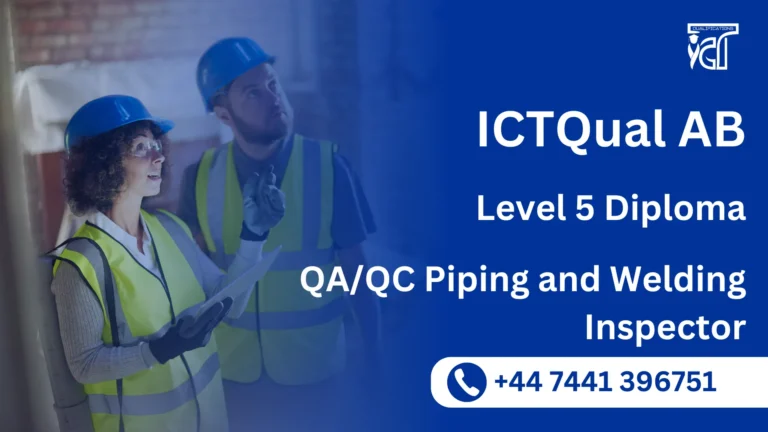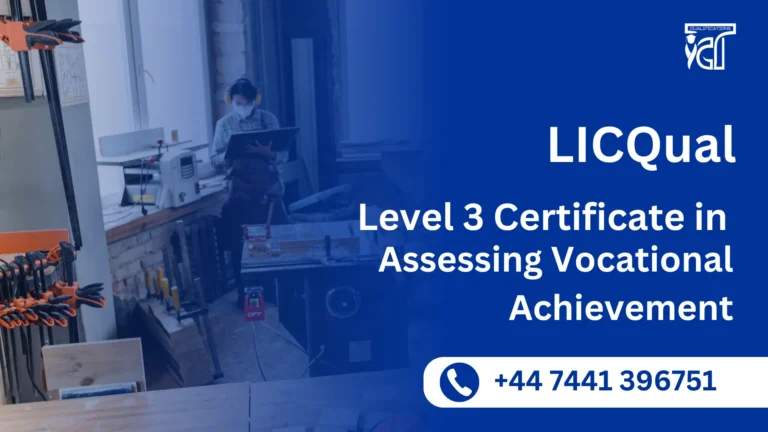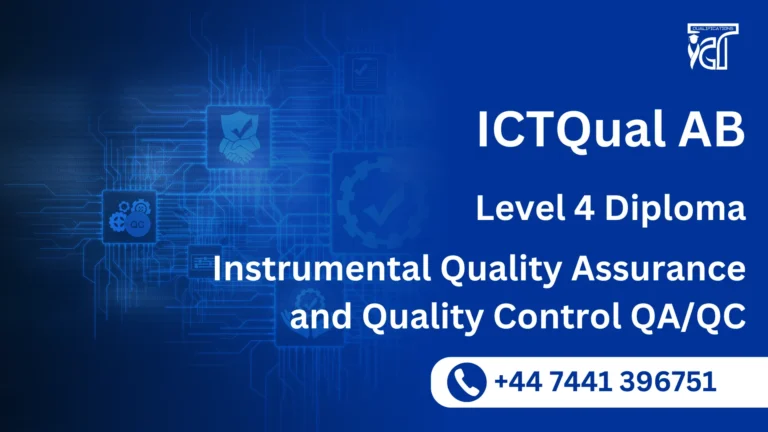The ICTQual AB Level 3 Certificate in Quality of Life – Living Environment explores how the spaces we inhabit directly influence well‑being, comfort, and overall life satisfaction. This qualification is designed to help learners understand the relationship between environmental quality and human health, safety, and happiness, while equipping them with practical strategies to improve living conditions.
Learners will examine key aspects of the living environment, including housing standards, community infrastructure, access to green spaces, and environmental sustainability. The course emphasizes how factors such as air quality, noise control, sanitation, and safe design contribute to healthier and more fulfilling lifestyles. By studying these dimensions, participants gain insights into how living environments shape both individual and collective quality of life.
Through case studies and applied learning, learners will develop the ability to assess living environments and propose improvements that enhance well‑being. The course highlights the importance of inclusive design, equitable access to resources, and sustainable practices, preparing participants to contribute meaningfully to community development and environmental quality initiatives.
Ultimately, the ICTQual AB Level 3 Certificate in Quality of Life – Living Environment provides learners with the knowledge and skills to evaluate and improve the spaces where people live. It is particularly valuable for individuals interested in housing, urban planning, community development, or environmental health, as well as those seeking to build careers that promote healthier, safer, and more sustainable living environments.
ICTQual AB Level 3 Certificate in Quality of Life – Living Environment
This qualification, the ICTQual AB Level 3 Certificate in Quality of Life – Living Environment, consists of 3 mandatory units.
| Sr# | Unit Title |
| 1 | Principles of Quality of Life and the Living Environment |
| 2 | Environmental Factors and Their Impact on Wellbeing |
| 3 | Strategies for Creating Sustainable and Supportive Living Environments |
Learning Outcomes for the ICTQual AB Level 3 Certificate in Quality of Life – Living Environment:
Principles of Quality of Life and the Living Environment
- Understand the core concepts of quality of life and how they relate to the living environment.
- Analyse the relationship between physical, social, and cultural environments and overall wellbeing.
- Identify key indicators used to measure quality of life in different contexts.
- Evaluate theoretical models that explain the link between environment and life satisfaction.
- Develop awareness of how housing, community design, and access to resources affect wellbeing.
- Apply critical thinking to assess the role of environment in shaping personal and collective experiences.
- Demonstrate the ability to connect personal reflections with broader quality of life frameworks.
- Reflect on the importance of sustainable environments in supporting long‑term wellbeing.
Environmental Factors and Their Impact on Wellbeing
- Examine the influence of environmental factors such as housing, safety, and infrastructure on wellbeing.
- Assess the role of natural and built environments in shaping life satisfaction.
- Explore how cultural and social environments contribute to individual and community wellbeing.
- Analyse the impact of environmental inequalities on quality of life outcomes.
- Apply research skills to investigate case studies of environmental wellbeing.
- Evaluate strategies used by communities and organisations to improve living conditions.
- Demonstrate the ability to interpret data and evidence related to environmental wellbeing.
- Reflect on how environmental challenges can be addressed through sustainable practices.
Strategies for Creating Sustainable and Supportive Living Environments
- Identify practical strategies for designing environments that promote wellbeing and life satisfaction.
- Apply principles of sustainability to the development of supportive living spaces.
- Evaluate workplace and community practices that enhance environmental quality of life.
- Develop skills in planning and implementing wellbeing‑focused environmental initiatives.
- Explore approaches to balancing environmental, social, and economic needs.
- Assess the role of policy, governance, and community engagement in creating supportive environments.
- Create action plans for applying sustainable strategies in real‑world contexts.
- Demonstrate the ability to adapt strategies to diverse cultural and professional settings.
The ICTQual AB Level 3 Certificate in Quality of Life – Living Environment is designed to help learners understand how housing, community spaces, and environmental factors influence well‑being and satisfaction. This qualification equips participants with the knowledge and skills to evaluate, improve, and sustain healthier, safer, and more fulfilling living environments.
Personal Growth and Awareness
- Gain insights into how living conditions impact health, safety, and happiness.
- Learn strategies to create balanced, sustainable, and comfortable living spaces.
- Develop awareness of environmental factors such as air quality, noise, and sanitation.
- Strengthen the ability to reflect on personal and community needs for better living standards.
Practical Application in Daily Life
- Apply theoretical concepts to real‑world housing and community scenarios.
- Learn to assess and improve living environments using practical tools and case studies.
- Acquire skills to promote sustainable practices in households and communities.
- Understand how infrastructure and design contribute to long‑term well‑being.
Career and Professional Development
- Enhance employability in housing, urban planning, environmental health, and community development.
- Qualify for roles such as Housing Support Officer, Community Development Assistant, or Environmental Health Technician.
- Gain recognition for applying living environment principles in professional contexts.
- Prepare for progression into advanced qualifications in social sciences, environmental studies, or quality of life programs.
Contribution to Society and Community
- Support initiatives that improve housing standards and community infrastructure.
- Help communities adopt sustainable practices for healthier living environments.
- Contribute to projects that enhance access to safe, inclusive, and equitable spaces.
- Strengthen the ability to inspire others toward healthier, safer, and more sustainable lifestyles.
The ICTQual AB Level 3 Certificate in Quality of Life – Living Environment is designed for individuals who want to understand how housing, community spaces, and environmental factors shape well‑being and satisfaction. This qualification is suitable for learners motivated to explore the link between living conditions and quality of life, and who wish to apply this knowledge to improve both personal and community environments.
Personal Development Seekers
- Individuals interested in enhancing awareness of how living environments affect health and happiness.
- Learners motivated to adopt sustainable and healthier lifestyle practices.
- Those seeking practical strategies to improve their own living spaces.
- People who want to reflect on community needs and contribute to better living standards.
Aspiring Professionals in Housing and Community Development
- Candidates aiming for careers in housing, urban planning, environmental health, or community development.
- Learners who wish to integrate environmental quality principles into professional practice.
- Individuals preparing for advanced qualifications in social sciences, environmental studies, or quality of life programs.
- Professionals seeking to add community‑focused well‑being skills to their existing roles.
Learners with Foundational Education and Skills
- Participants who have completed secondary education or equivalent qualifications.
- Those with basic literacy, numeracy, and IT skills to support study and application.
- Learners with language proficiency at CEFR A2–B1 level in English or the language of instruction.
- Candidates with or without prior work experience, but with a strong interest in environmental and social well‑being.
Future‑Focused Candidates
- Individuals motivated to contribute positively to communities through sustainable living initiatives.
- Learners who aspire to promote healthier, safer, and more inclusive environments.
- Those seeking to progress into leadership roles in housing, environmental health, or community development.
Completing the ICTQual AB Level 3 Certificate in Quality of Life – Living Environment provides learners with a strong foundation to advance academically and professionally in areas related to housing, community development, and environmental well‑being. This qualification opens pathways to higher‑level study, specialized certifications, and diverse career opportunities where the living environment plays a central role in improving quality of life.
Academic Progression
- Progress to ICTQual AB Level 4 Diploma in Quality of Life, Environmental Studies, or Community Development.
- Pursue advanced qualifications in urban planning, housing management, or environmental health.
- Access specialized certifications in sustainable development, environmental management, or public health.
- Build a pathway toward international qualifications in social sciences, environmental studies, and community leadership.
Professional Development
- Enhance employability in housing, urban planning, environmental health, and community development sectors.
- Qualify for roles such as Housing Support Officer, Community Development Assistant, or Environmental Health Technician.
- Strengthen career prospects by applying knowledge of living environments to improve well‑being.
- Prepare for supervisory or leadership positions in housing, infrastructure, or environmental quality programs.
Industry Opportunities
- Contribute to organizations focused on sustainable housing and community infrastructure.
- Support initiatives that improve sanitation, safety, and access to green spaces.
- Apply skills in diverse sectors including healthcare, education, non‑profit, and government agencies.
- Position yourself as a valuable resource in industries where living environments directly impact health and satisfaction.
Long‑Term Career Pathways
- Progress toward senior roles such as Environmental Health Specialist, Housing Manager, or Community Development Strategist.
- Gain recognition as a professional capable of integrating environmental quality into organizational success.
- Explore opportunities for international employment in housing, urban planning, and social development.
- Build a career trajectory that emphasizes sustainability, inclusivity, and long‑term community well‑being.
Entry Requirements
Learners must meet the following criteria to be considered for admission into the course:
- Age Requirement: Learners must typically be 18 years of age or older at the time of enrolment
- Educational Background: Completion of secondary school education or equivalent qualification. Prior Level 2 qualification in social sciences, environmental studies, or vocational fields is helpful but not mandatory.
- Work Experience: No compulsory work experience required, making the course suitable for beginners and school leavers. Recommended 6–12 months of exposure in areas such as housing, community service, environmental health, or urban development.
- English Language Proficiency: Competence in English or the language of instruction is required, with a recommended proficiency level of CEFR A2–B1. Learners should be able to read, write, and communicate effectively to engage with course materials and discussions.
Register Now
Qualification Process
Qualification Process for the ICTQual AB Level 3 Certificate in Quality of Life – Living Environment
- Self-Assessment:
Begin by evaluating your eligibility to ensure you meet the qualification requirements, including work experience, knowledge, and language proficiency. - Registration:
Complete your registration by submitting the required documents, including a scanned copy of a valid ID, and paying the registration fee. - Induction:
An assessor will conduct an induction to confirm your eligibility for the course and explain the evidence requirements. If you do not meet the criteria, your registration will be cancelled, and the fee will be refunded. - Assignments & Evidence Submission:
Provide all assignments and the necessary evidence based on the assessment criteria outlined in the course. If you are unsure of the required evidence, consult with the assessor for guidance on the type and nature of evidence needed. - Feedback and Revision:
The assessor will review your submitted evidence and provide feedback. Evidence that meets the criteria will be marked as “Criteria Met,” while any gaps will be identified. You will be asked to revise and resubmit if needed. - Competence Evidence:
Submit final evidence demonstrating that all learning outcomes have been met. This evidence will be marked as “Criteria Met” by the assessor once it is satisfactory. - Internal Quality Assurance (IQA):
The Internal Quality Assurance Verifier (IQA) will review your evidence to ensure consistency, quality, and compliance with standards. - External Verification:
The IQA will submit your portfolio to ICTQUAL AB External Quality Assurance Verifiers (EQA) for final confirmation. The EQA may contact you directly to verify the authenticity of your evidence. - Certification:
Upon successful completion of all checks, ICTQUAL AB will issue your official certificate, confirming that you have attained the ICTQual AB Level 3 Certificate in Quality of Life – Living Environment.







